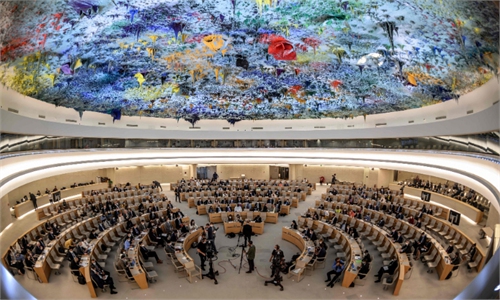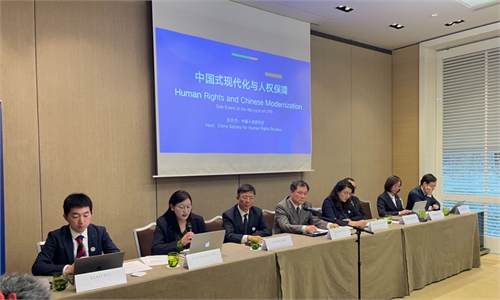IN-DEPTH / IN-DEPTH
Chinese NGOs carry out exchange activities, dispel misunderstandings on human rights at UN meeting
Editor's Note:
The United Nations Human Rights Council's Universal Periodic Review (UPR) Working Group conducted a fourth review of China's human rights situation in Geneva on January 23. During the review, representatives from 161 countries requested to speak - the highest number in history. Among them, more than 120 countries positively evaluated the progress of China's human rights developments.
The China Society for Human Rights Studies, a non-governmental organization (NGO), and several other Chinese NGOs attended the review and held some side events. Global Times reporter Fan Lingzhi followed the review in Geneva and witnessed how Chinese NGOs carry out exchanges with international scholars and their counterparts.
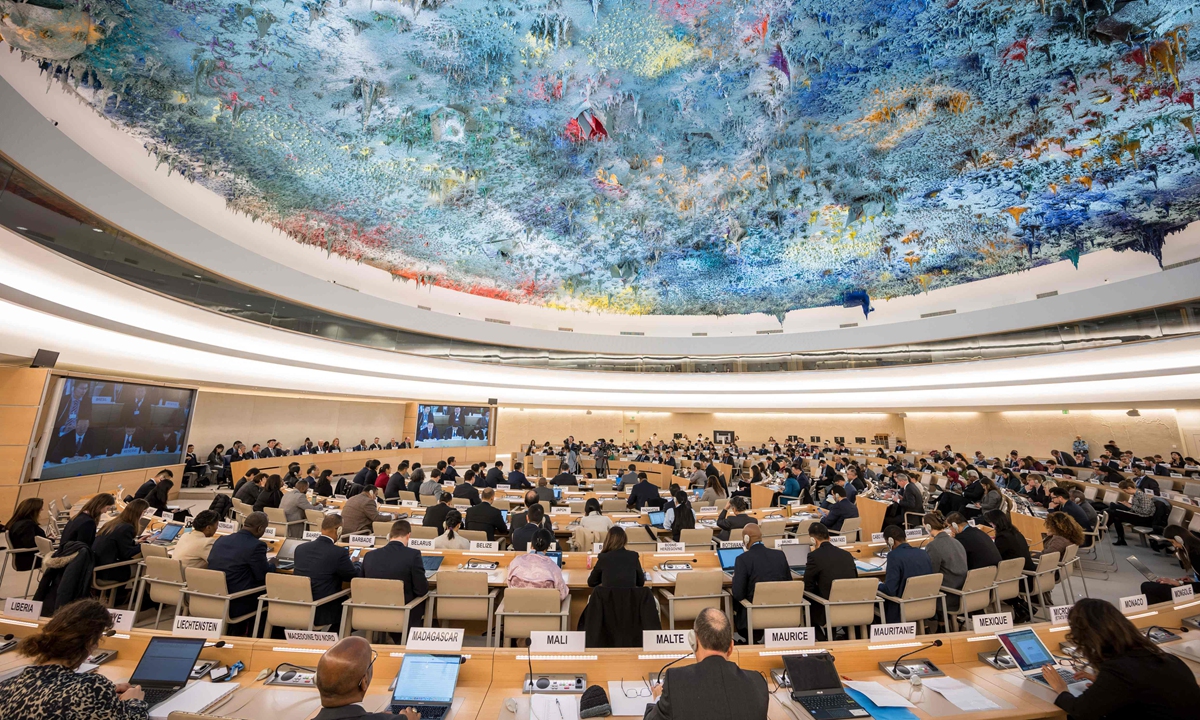
Room XX of the Palais des Nations is also known as the "Human Rights and Alliance of Civilizations Room." It is used by the United Nations Human Rights Council on a regular basis and is easy to recognize.
The most distinctive feature of the room is the colorful giant dome created by contemporary artist Miquel Barceló. Some people interpret the dome as a reminder that the different shapes and colors of the protrusions represent different opinions and perspectives. Under the dome, representatives from different countries examine, discuss, and deal with human rights issues, which are closely related to all of humanity.
Since 2008, the UPR mechanism of the United Nations Human Rights Council has begun to conduct a rotating review of the human rights situation of all UN member states. China participated in the reviews in February 2009, October 2013, and November 2018.
On January 23, China participated in the fourth round of the UPR of the UN Human Rights Council. In the review that day, the progress of China's human rights cause was highly praised by more than 120 countries.
According to the procedures, China submitted a national human rights report before the review. During the review, the Chinese delegation first made a brief introduction, and then other countries were allowed to ask questions and make comments and suggestions in the interactive dialogue session. China responded to the questions raised during the interaction.
It was interesting to observe the speeches of the representatives of various countries on the spot as they reflected each country's understanding of the development of China's human rights and the connection between this development and their own countries.
For example, many developing countries mentioned that China has formulated and implemented the four-phase national human rights action plan, and the progress China has made in poverty alleviation, the social security system, and women's rights. The number of countries that can accurately articulate China's specific measures and legal provisions are many.
Although China's achievements in human rights development are quite impressive, there are always critics who ignore the facts. A few Western countries led by the US still try to put forward so-called "suggestions" based on false information about China's Xinjiang, Xizang, and Hong Kong regions.
According to the Global Times' observation, some countries only based their speeches on rumors hyped by some Western media outlets.
A small number of countries seemed afraid of missing any opportunity to "condemn" China, to the point of skipping over opening thanks and acknowledgements. Christoph Stückelberger, president of the Geneva Agape Foundation expressed his "shock" at this aggressive behavior when communicating with the China Society for Human Rights Studies and said: "This is unacceptable in diplomacy."
In his concluding remarks, Ambassador Chen Xu, head of the Chinese Mission to the United Nations in Geneva and head of the Chinese delegation for the review, strongly condemned the unfounded accusations and smears made by a few countries and said that utterances are not in line with the purpose and principles of the UPR.
A few countries, intent on using human rights to smear China, interfere in China's internal affairs, and suppress and contain China's development, which China firmly opposes.
"We hope that individual countries will stop politicizing human rights issues, and objectively and fairly evaluate the development of China's human rights developments, uphold the authority of the UPR and the atmosphere of dialogue and cooperation, and inject positive energy into the development of the international human rights cause," said Chen.
"This round of reviews once again proves China's global influence and where the attention and expectation of the international community toward China is," Dai Ruijun, a member of the China Society for Human Rights Studies and a researcher at the Institute of International Law at the Chinese Academy of Social Sciences, told the Global Times.
Compared with the review of other countries on the previous day, all seats in Room XX of government representatives, media outlets from various countries, and domestic and foreign NGOs were taken. Many people were unable to enter the venue due to the lack of seats.
During the review, most countries recognized the Chinese government's unremitting efforts to promote and protect human rights since the last review cycle, and put forward a large number of constructive suggestions for China to further improve the level of human rights protection.
Developing countries have recognized China's contributions to amplifying the voice and influence of developing countries in the UN human rights mechanism and promotion of the healthy development of the UN human rights mechanism.
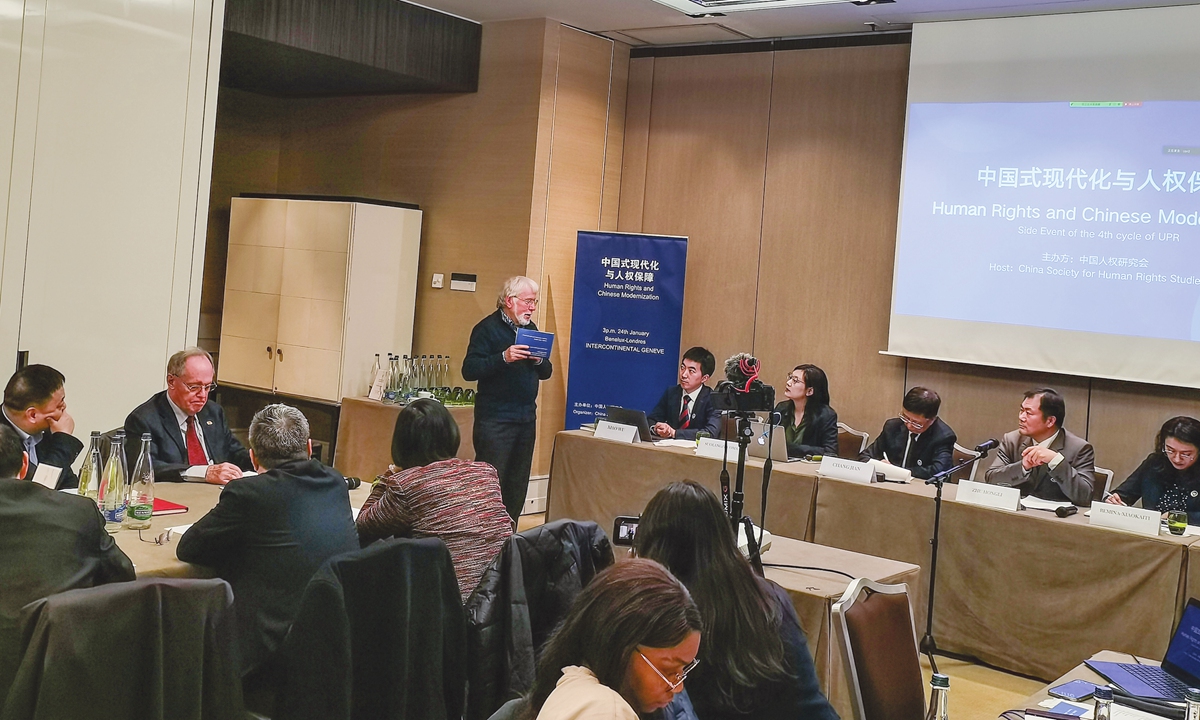
Wider friend circle
The Global Times found that during the UPR, anti-China forces from the US and other Western countries had also stepped up efforts in causing trouble inside and outside the venue. Within such a contest, Chinese NGOs played a unique role in safeguarding national interests and their own legitimate rights and interests.
Strengthening exchanges with people from all walks of life in the international community was the most important work of Chinese NGOs while in Geneva. The UN Human Rights Council's Practical Guide for NGO Participants clearly stipulates that NGOs with consultative status with the UN Economic and Social Council (ECOSOC) can hold side events on issues related to the work of the Human Rights Council.
Before and after China participated in the fourth round of the UPR, many organizations and institutions, including the China Society for Human Rights Studies, held side events on various themes, including Human Rights and Chinese Modernization. They deeply discussed the development of human rights and global human rights governance, effectively overshadowing the harassment and noise from the anti-China forces.
More than 50 experts, scholars, representatives of social organizations, and media representatives from China and abroad attended the side event on Chinese modernization and human rights protection held by the China Society for Human Rights Studies.
Seven Chinese scholars from universities and research institutions such as Nankai University, Southwest University of Political Science and Law, Jinan University, Central South University, and Xinjiang University introduced the development of China's human rights development from different perspectives.
The Chinese people have every reason to be proud of their country. In the interactive session of the side event, Peter Hediger, a Swiss sinologist, historian, and international security policy expert, noted that he was deeply impressed by the achievements of China's human rights development.
The Swiss expert also mentioned the famous saying "When the Great Way is practiced, the world is for the public" from the "Liyun" chapter of the "Book of Rites," a Chinese classic, and said this reflects the sense of responsibility possessed by the ancients of China.
Hediger believes that the reason why the US is trying to contain China is influenced by the notion of the US being the only superpower while ignoring the realities of the new era, where multilateralism is the only way to solve global problems.
At the side event, some foreign guests also had in-depth discussions with Chinese scholars on specific academic issues.
For example, some scholars were interested in the changes in the English translation of Xizang. Xiao Wu, a member of the delegation of the China Society for Human Rights Studies and an associate professor of the Human Rights Research Institute of the Southwest University of Political Science and Law, answered from the perspectives of history and international naming norms.
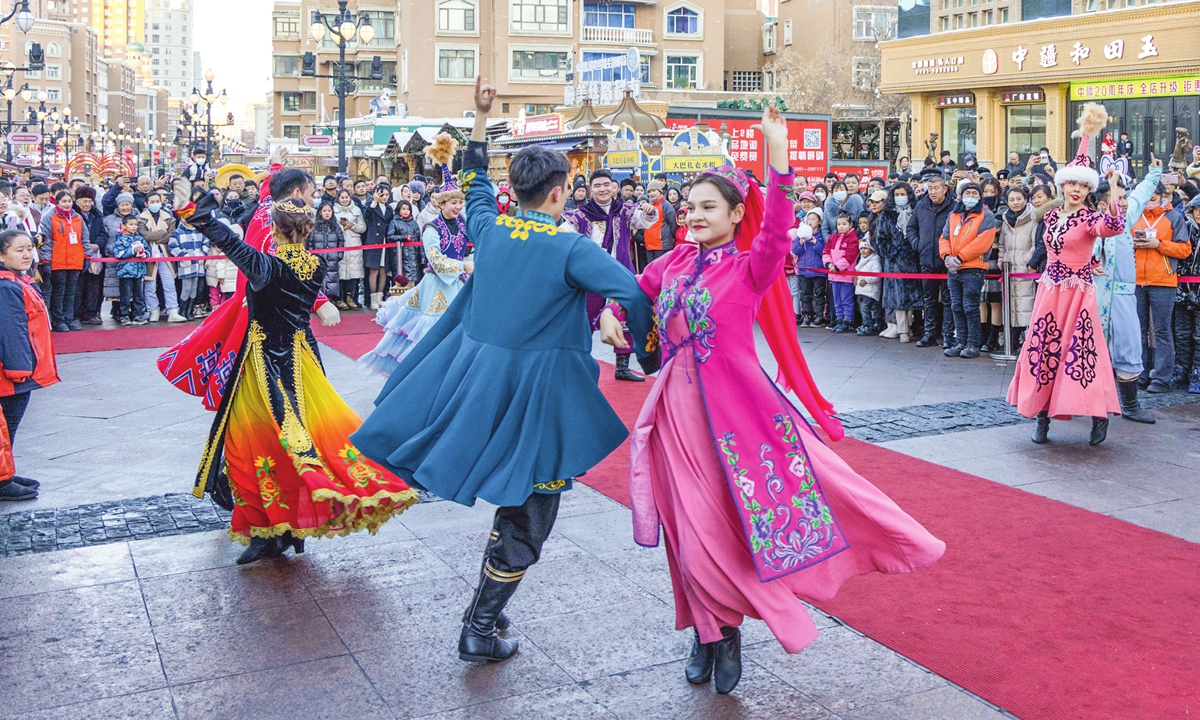
"Academic exchanges can help dispel many misunderstandings, and professional discussions can help to free views of preconceived political prejudices," Zheng Ruohan, vice president of the Yige Social Development Promotion Center in Chongqing, who also participated in the side event, told the Global Times.
Zheng noted that China's international human rights exchanges are increasingly focused on dialogue and are not afraid of inquiry.
Outside the conference venues in the Palais des Nations, making more connections was also an important task for Chinese NGOs.
The Global Times learned that during China's participation in the fourth round of the UPR, the China Society for Human Rights Studies also paid visits to many social organizations and relevant universities and academic institutions. Communication, cooperation, and equal consultation have always been the move and expectation in the international human rights field.
Relentless efforts
In the Palais des Nations, some Western countries were quick to apportion blame, but on the street a few hundred meters away, the human rights problems in front of them did not seem to attract much attention. Beggers who asked for handouts outside the hallowed venue were promptly ignored.
"I didn't see so many beggars when I came to Switzerland a few years ago, but this time I can see them at the door of every shopping mall. I was surprised," Chang Jian, director of the Human Rights Research Center at Nankai University, told the Global Times.
Although some Western countries have different social perceptions of begging than China, it is, after all a matter of people's basic right to survival. Moreover, most of these beggars seem to be refugees from other countries who are fleeing war, said the expert.
"These wars are inextricably linked to the US and other Western countries. On the one hand, they make the people of these countries homeless and relentlessly trample on their human rights. On the other hand, they slander the stability and harmony of China's Xinjiang as 'genocide.' This highlights the politicization, weaponization, and double standards of the West on human rights issues, which causes great damage to the healthy development of the global human rights cause," said Chang.
In Zheng Ruohan's view, solving the problem of poverty first requires political determination and political consensus. In fact, in many Western countries, there are also many advocacy groups that try to attract attention to and solve the problem of poverty through advocacy means.
However, due to the high cost of lobbying, it is difficult for these economically disadvantaged groups to truly achieve their goals in the short term. In contrast, the Chinese government can integrate social interests and better represent and express the interests of the poor, said Zheng.
Carrying out international human rights exchanges and letting more countries understand and agree with China's view on human rights cannot be achieved overnight.
Language, culture, values, international rules... These are all issues that need to be addressed in international human rights exchanges. The more difficult the road of exploration, the more Chinese NGOs should go out with an open and confident attitude to participate in the UN multilateral mechanism. This has become the consensus of many scholars of the China Society for Human Rights Studies.
Positive changes can only be achieved by working hard for a long time. At a side event, Suolang Zhuoma, an assistant researcher from the China Tibetology Research Center, introduced the inheritance and protection of traditional culture to the guests in fluent English. Her speech impressed many guests.
"Coffee is my favorite thing in life. I like to try every new flavor myself, rather than following other people's suggestions, because different people have different tastes. Speaking of this, I want to say that Xizang is like a cup of coffee. You have to try it yourself and experience it yourself. This means that only by coming to Xizang and seeing it with your own eyes can you have an objective and correct understanding of Xizang and its culture," said the expert.
A short video of Suolang Zhuoma's speech also became a hot search topic on the Internet.
Chang Jian believes that as an NGO, when participating in international human rights exchanges, it is not only necessary to be familiar with the UN's human rights discourse, but also to be good at using more vivid language.
The expert noted that in recent years, Chinese NGOs have been increasingly active in participating in the UN Human Rights Council meetings. They not only actively strive to speak at the meetings, but also hold side events to discuss how to promote the development of human rights in China and the world. The topics and contents of their speeches are becoming more and more specific, and the forums are becoming more and more vivid.
The United Nations Human Rights Council's Universal Periodic Review (UPR) Working Group conducted a fourth review of China's human rights situation in Geneva on January 23. During the review, representatives from 161 countries requested to speak - the highest number in history. Among them, more than 120 countries positively evaluated the progress of China's human rights developments.
The China Society for Human Rights Studies, a non-governmental organization (NGO), and several other Chinese NGOs attended the review and held some side events. Global Times reporter Fan Lingzhi followed the review in Geneva and witnessed how Chinese NGOs carry out exchanges with international scholars and their counterparts.

A picture taken on January 23, 2024 shows the United Nations Human Rights Council during the review of China's human rights at the UN Offices in Geneva. Photo: VCG
It was still dark and rainy in Geneva around 7 am on the morning of January 23. Representatives from Chinese NGOs had already lined up at the entrance of the Palais des Nations to attend the Universal Periodic Review (UPR) of China as observers. They had not yet adjusted to the time difference, but they were eager to participate in the review.Room XX of the Palais des Nations is also known as the "Human Rights and Alliance of Civilizations Room." It is used by the United Nations Human Rights Council on a regular basis and is easy to recognize.
The most distinctive feature of the room is the colorful giant dome created by contemporary artist Miquel Barceló. Some people interpret the dome as a reminder that the different shapes and colors of the protrusions represent different opinions and perspectives. Under the dome, representatives from different countries examine, discuss, and deal with human rights issues, which are closely related to all of humanity.
Since 2008, the UPR mechanism of the United Nations Human Rights Council has begun to conduct a rotating review of the human rights situation of all UN member states. China participated in the reviews in February 2009, October 2013, and November 2018.
On January 23, China participated in the fourth round of the UPR of the UN Human Rights Council. In the review that day, the progress of China's human rights cause was highly praised by more than 120 countries.
According to the procedures, China submitted a national human rights report before the review. During the review, the Chinese delegation first made a brief introduction, and then other countries were allowed to ask questions and make comments and suggestions in the interactive dialogue session. China responded to the questions raised during the interaction.
It was interesting to observe the speeches of the representatives of various countries on the spot as they reflected each country's understanding of the development of China's human rights and the connection between this development and their own countries.
For example, many developing countries mentioned that China has formulated and implemented the four-phase national human rights action plan, and the progress China has made in poverty alleviation, the social security system, and women's rights. The number of countries that can accurately articulate China's specific measures and legal provisions are many.
Although China's achievements in human rights development are quite impressive, there are always critics who ignore the facts. A few Western countries led by the US still try to put forward so-called "suggestions" based on false information about China's Xinjiang, Xizang, and Hong Kong regions.
According to the Global Times' observation, some countries only based their speeches on rumors hyped by some Western media outlets.
A small number of countries seemed afraid of missing any opportunity to "condemn" China, to the point of skipping over opening thanks and acknowledgements. Christoph Stückelberger, president of the Geneva Agape Foundation expressed his "shock" at this aggressive behavior when communicating with the China Society for Human Rights Studies and said: "This is unacceptable in diplomacy."
In his concluding remarks, Ambassador Chen Xu, head of the Chinese Mission to the United Nations in Geneva and head of the Chinese delegation for the review, strongly condemned the unfounded accusations and smears made by a few countries and said that utterances are not in line with the purpose and principles of the UPR.
A few countries, intent on using human rights to smear China, interfere in China's internal affairs, and suppress and contain China's development, which China firmly opposes.
"We hope that individual countries will stop politicizing human rights issues, and objectively and fairly evaluate the development of China's human rights developments, uphold the authority of the UPR and the atmosphere of dialogue and cooperation, and inject positive energy into the development of the international human rights cause," said Chen.
"This round of reviews once again proves China's global influence and where the attention and expectation of the international community toward China is," Dai Ruijun, a member of the China Society for Human Rights Studies and a researcher at the Institute of International Law at the Chinese Academy of Social Sciences, told the Global Times.
Compared with the review of other countries on the previous day, all seats in Room XX of government representatives, media outlets from various countries, and domestic and foreign NGOs were taken. Many people were unable to enter the venue due to the lack of seats.
During the review, most countries recognized the Chinese government's unremitting efforts to promote and protect human rights since the last review cycle, and put forward a large number of constructive suggestions for China to further improve the level of human rights protection.
Developing countries have recognized China's contributions to amplifying the voice and influence of developing countries in the UN human rights mechanism and promotion of the healthy development of the UN human rights mechanism.

An event on human rights and Chinese modernization is held in Geneva, Switzerland on January 24, 2024. Photo: Fan Lingzhi/GT
Wider friend circle
The Global Times found that during the UPR, anti-China forces from the US and other Western countries had also stepped up efforts in causing trouble inside and outside the venue. Within such a contest, Chinese NGOs played a unique role in safeguarding national interests and their own legitimate rights and interests.
Strengthening exchanges with people from all walks of life in the international community was the most important work of Chinese NGOs while in Geneva. The UN Human Rights Council's Practical Guide for NGO Participants clearly stipulates that NGOs with consultative status with the UN Economic and Social Council (ECOSOC) can hold side events on issues related to the work of the Human Rights Council.
Before and after China participated in the fourth round of the UPR, many organizations and institutions, including the China Society for Human Rights Studies, held side events on various themes, including Human Rights and Chinese Modernization. They deeply discussed the development of human rights and global human rights governance, effectively overshadowing the harassment and noise from the anti-China forces.
More than 50 experts, scholars, representatives of social organizations, and media representatives from China and abroad attended the side event on Chinese modernization and human rights protection held by the China Society for Human Rights Studies.
Seven Chinese scholars from universities and research institutions such as Nankai University, Southwest University of Political Science and Law, Jinan University, Central South University, and Xinjiang University introduced the development of China's human rights development from different perspectives.
The Chinese people have every reason to be proud of their country. In the interactive session of the side event, Peter Hediger, a Swiss sinologist, historian, and international security policy expert, noted that he was deeply impressed by the achievements of China's human rights development.
The Swiss expert also mentioned the famous saying "When the Great Way is practiced, the world is for the public" from the "Liyun" chapter of the "Book of Rites," a Chinese classic, and said this reflects the sense of responsibility possessed by the ancients of China.
Hediger believes that the reason why the US is trying to contain China is influenced by the notion of the US being the only superpower while ignoring the realities of the new era, where multilateralism is the only way to solve global problems.
At the side event, some foreign guests also had in-depth discussions with Chinese scholars on specific academic issues.
For example, some scholars were interested in the changes in the English translation of Xizang. Xiao Wu, a member of the delegation of the China Society for Human Rights Studies and an associate professor of the Human Rights Research Institute of the Southwest University of Political Science and Law, answered from the perspectives of history and international naming norms.

Dancers perform for tourists in Urumqi, Northwest China's Xinjiang Uygur Autonomous Region on January 1, 2024. Photo: VCG
"Academic exchanges can help dispel many misunderstandings, and professional discussions can help to free views of preconceived political prejudices," Zheng Ruohan, vice president of the Yige Social Development Promotion Center in Chongqing, who also participated in the side event, told the Global Times.
Zheng noted that China's international human rights exchanges are increasingly focused on dialogue and are not afraid of inquiry.
Outside the conference venues in the Palais des Nations, making more connections was also an important task for Chinese NGOs.
The Global Times learned that during China's participation in the fourth round of the UPR, the China Society for Human Rights Studies also paid visits to many social organizations and relevant universities and academic institutions. Communication, cooperation, and equal consultation have always been the move and expectation in the international human rights field.
Relentless efforts
In the Palais des Nations, some Western countries were quick to apportion blame, but on the street a few hundred meters away, the human rights problems in front of them did not seem to attract much attention. Beggers who asked for handouts outside the hallowed venue were promptly ignored.
"I didn't see so many beggars when I came to Switzerland a few years ago, but this time I can see them at the door of every shopping mall. I was surprised," Chang Jian, director of the Human Rights Research Center at Nankai University, told the Global Times.
Although some Western countries have different social perceptions of begging than China, it is, after all a matter of people's basic right to survival. Moreover, most of these beggars seem to be refugees from other countries who are fleeing war, said the expert.
"These wars are inextricably linked to the US and other Western countries. On the one hand, they make the people of these countries homeless and relentlessly trample on their human rights. On the other hand, they slander the stability and harmony of China's Xinjiang as 'genocide.' This highlights the politicization, weaponization, and double standards of the West on human rights issues, which causes great damage to the healthy development of the global human rights cause," said Chang.
In Zheng Ruohan's view, solving the problem of poverty first requires political determination and political consensus. In fact, in many Western countries, there are also many advocacy groups that try to attract attention to and solve the problem of poverty through advocacy means.
However, due to the high cost of lobbying, it is difficult for these economically disadvantaged groups to truly achieve their goals in the short term. In contrast, the Chinese government can integrate social interests and better represent and express the interests of the poor, said Zheng.
Carrying out international human rights exchanges and letting more countries understand and agree with China's view on human rights cannot be achieved overnight.
Language, culture, values, international rules... These are all issues that need to be addressed in international human rights exchanges. The more difficult the road of exploration, the more Chinese NGOs should go out with an open and confident attitude to participate in the UN multilateral mechanism. This has become the consensus of many scholars of the China Society for Human Rights Studies.
Positive changes can only be achieved by working hard for a long time. At a side event, Suolang Zhuoma, an assistant researcher from the China Tibetology Research Center, introduced the inheritance and protection of traditional culture to the guests in fluent English. Her speech impressed many guests.
"Coffee is my favorite thing in life. I like to try every new flavor myself, rather than following other people's suggestions, because different people have different tastes. Speaking of this, I want to say that Xizang is like a cup of coffee. You have to try it yourself and experience it yourself. This means that only by coming to Xizang and seeing it with your own eyes can you have an objective and correct understanding of Xizang and its culture," said the expert.
A short video of Suolang Zhuoma's speech also became a hot search topic on the Internet.
Chang Jian believes that as an NGO, when participating in international human rights exchanges, it is not only necessary to be familiar with the UN's human rights discourse, but also to be good at using more vivid language.
The expert noted that in recent years, Chinese NGOs have been increasingly active in participating in the UN Human Rights Council meetings. They not only actively strive to speak at the meetings, but also hold side events to discuss how to promote the development of human rights in China and the world. The topics and contents of their speeches are becoming more and more specific, and the forums are becoming more and more vivid.


